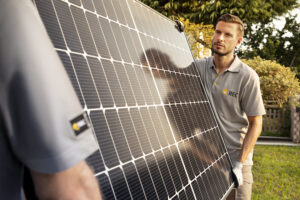TL;DR:
In short, yes – installing solar panels can increase your property’s value. Solar power is an attractive feature for buyers due to its energy efficiency, cost savings, and environmental benefits. With the rising interest in sustainable living, homes equipped with solar panels tend to sell faster and at higher prices. However, the actual increase in value can vary depending on location, property type, and the quality and overall aesthetics of the solar installation.
Introduction
Solar energy is becoming an essential part of modern homes as more homeowners turn to renewable solutions to reduce their energy bills and environmental impact. With electricity costs rising, many buyers prefer homes with solar panels to secure long-term savings. However, homeowners often wonder whether the investment is worth it in terms of resale value. Understanding the financial and practical impact of solar panel installation can help homeowners make informed decisions.
In this article, we explore the benefits of solar panels, how they influence property value, the key factors that determine this increase, available government incentives, and common misconceptions about solar energy and real estate. By the end, you’ll have a clear understanding of whether solar is a wise investment for your home.
Understanding the Value of Solar Power
Solar power harnesses energy from the sun and converts it into electricity that can be used to power homes. The key benefits of solar energy include lower electricity bills, reduced reliance on fossil fuels, and a decreased carbon footprint. According to the Australian Energy Council’s Solar Report for Q1 2024, as of February 29, 2024, Australia has 3,742,601 registered rooftop solar installations, totalling a capacity of 22.58 gigawatts (GW). In the first quarter of 2024 alone, 50,975 new installations were added, contributing 508 megawatts (MW) to the nation’s solar photovoltaic (PV) capacity.¹
Sustainable living is becoming a necessity. Many homeowners are investing in eco-friendly upgrades to reduce their environmental impact and future-proof their homes. The increasing emphasis on sustainability has made solar power an attractive feature for homebuyers who want energy-efficient properties that align with their values.
Does Solar Add Value to Your Home?
The big question – do solar panels add value to your home? Solar panels are more than just an eco-friendly upgrade – they can also boost your home’s resale value. A 2023 CommBank newsroom report found that 71% of Australians believe a home with solar panels and other energy-efficient features is more valuable than one without.²
How Much Value Do Solar Panels Add?
While the exact increase depends on factors like location and buyer demand, research suggests solar panels can make a significant difference:
- A 2022 Origin Energy survey found that when it comes to solar panels, a relatively higher percentage (12%) of respondents expressed willingness to pay at least 5% more for a property with this specific feature.³
- Domain’s 2024 Sustainability in Property Report shows that energy-efficient houses and apartments can sell for $112,000 and $70,000 more, respectively, compared to less efficient properties. However, these figures include other sustainable features beyond solar.⁴
Why Do Solar Panels Increase Property Value?
The main reason? Lower electricity costs. A home with solar panels offers buyers the potential for immediate and long-term savings on energy bills, making it a more attractive investment than a home without solar.
Given that the average solar system costs around $5,100,⁵ the potential return on investment makes solar panels a smart choice – whether you’re looking to save on power bills now or increase your home’s value when it’s time to sell.
Factors That Influence the Increase in Property Value
The extent to which solar panels increase a home’s value depends on several factors. Geographic location plays a key role – homes in sunny regions with high electricity costs tend to see a greater return on investment from solar installations. The size and efficiency of the solar panel system also matter, as larger and higher-efficiency systems generate more power and increase a home’s appeal.
Additionally, the age and condition of the solar panels can affect property value. Buyers prefer newer solar systems with warranties, offering better long-term reliability. Local market demand is another key factor – in areas where sustainability is a priority, energy-efficient homes often command higher prices.
One big factor that we have personally found is the aesthetics of the solar panel installation. If the solar panels are an eyesore, no matter how effective or efficient they have been, the panels can greatly impact the sale value of a house. At Sunrays Power, we take great care to make sure our solar installations are completed in an aesthetically pleasing manner where possible.
The Role of Government Incentives and Rebates
The Australian government offers various incentives to encourage solar adoption. Programs such as the Small-scale Renewable Energy Scheme (SRES) provide financial benefits that help reduce the upfront cost of solar installations. These incentives make solar more accessible to homeowners and improve the return on investment, contributing to an increase in property value.⁶
When homeowners take advantage of government rebates, they can install high-quality solar systems at a fraction of the price. This makes their property more attractive to buyers and ensures they can recoup their investment faster while enjoying reduced energy bills.
Quality Matters: Choosing the Right Solar Panels
Not all solar panels are created equal. Selecting high-quality solar panels is important for ensuring long-term performance, efficiency, and safety. Premium panels offer better energy output and enhance your property’s overall value. Here’s why investing in top-tier solar components is essential:
Benefits of High-Quality Solar Panels
- Enhanced Durability: Reputable manufacturers like Jinko Solar produce panels designed to withstand harsh weather conditions, ensuring longevity and consistent performance.
- Improved Efficiency: High-quality panels utilise advanced technologies to maximise energy conversion, providing more electricity from the same amount of sunlight.
- Extended Warranties: Premium panels often come with longer warranty periods, reflecting the manufacturer’s confidence in their product’s lifespan and reliability.
Risks of Low-Quality Solar Panels
- Accelerated Degradation: Inferior panels may absorb moisture and air, leading to corrosion that reduces efficiency and shortens the system’s lifespan.
- Safety Hazards: Using substandard materials, such as plastic glue during installation, can compromise the system’s integrity, posing potential safety risks.
- Increased Maintenance Costs: Cheaper panels are more prone to failures, leading to frequent repairs and higher long-term expenses.
Investing in high-quality solar panels ensures better performance, safety, and return on investment. By choosing reputable brands and certified installers, homeowners can enjoy the benefits of renewable energy while enhancing their property’s value.
The Process of Installing Solar Panels
Installing solar panels involves several steps to ensure efficiency, safety, and maximum savings. Here’s a breakdown of the process:
Step 1: Assess Your Energy Needs
Before installing solar panels, determine your household’s energy consumption. Review your electricity bills to understand how much power you use and identify the ideal solar system size.
Step 2: Evaluate Roof Suitability
Not all roofs are ideal for solar panels. Consider factors such as:
- Roof size and shape
- Sun exposure and shading
- Roof material and condition (older roofs may need repairs before installation. Asbestos roofs will need to be removed by a certified asbestos removalist and a new roof should be installed prior to solar installation.)
Step 3: Research and Compare Solar Providers
Look for reputable solar companies with strong reviews and industry certifications. Compare multiple quotes to ensure you’re getting a competitive price and quality service. Consider reaching out to Sunrays Power – we’re known for our professional, aesthetically-pleasing installations and personalised approach to solar solutions. With years of experience and a focus on quality, we’re here to help you choose the right system for your needs and budget.
Step 4: Check for Government Incentives
Many governments offer rebates or tax credits to reduce the cost of solar installations. Research available programs in your area to take advantage of potential savings.
Step 5: Choose a Certified Installer
Selecting a licensed and accredited professional ensures your system is installed correctly and meets safety standards. Look for installers that are listed as a New Energy Tech Approved Seller, and make sure they are able to install the brands you are interested in. For example, some solar brands such as REC, and Tesla provide different warranties depending on whether your installer is accredited with their products.
Step 6: Solar Panel Installation
Once everything is approved, the installation team will:
- Install mounting equipment on your roof
- Secure the solar panels in place
- Connect the panels to the inverter, which converts solar energy into usable electricity
- Integrate the system with your electrical panel and, if applicable, the power grid
Step 7: Inspection and System Activation
After installation, a final inspection ensures the system meets local regulations. Once approved, your solar provider will activate the system, and you can start generating clean energy.
Step 8: Regular Maintenance for Optimal Performance
To maximise efficiency and lifespan:
- Schedule periodic inspections by a professional
- Clean the panels occasionally to remove dust and debris
- Monitor your energy output to detect any performance issues
By following these steps, homeowners can ensure a smooth solar installation process and enjoy long-term energy savings.
The Financial Benefits of Solar Panels
Beyond increasing property value, solar panels provide financial benefits in the form of energy savings. By generating their own electricity, homeowners can significantly reduce their monthly power bills. Additionally, solar users can earn credits through net metering by selling excess energy back to the grid.
Banks and insurance companies are also recognising the value of solar installations. Some lenders offer green home loans with favourable interest rates, while certain insurers provide discounts for energy-efficient properties. These financial perks further enhance the attractiveness of solar-powered homes.
Common Misconceptions About Solar Power and Property Value
Despite the proven benefits of solar panels, several misconceptions still exist. Let’s debunk some of the most common myths.
Myth: Solar Panels Are Too Expensive
Many believe that installing a solar energy system will be a costly investment that won’t pay off. However, government incentives and rebates significantly reduce installation costs, making solar more affordable than ever. Plus, the long-term energy savings often outweigh the initial expenditure, leading to a strong return on investment.
Myth: Solar Panels Require Extensive Maintenance
Some homeowners worry that solar panels need frequent servicing. In reality, modern solar systems are designed for durability and require minimal upkeep. Occasional cleaning and periodic professional inspections are usually enough to keep the system operating efficiently.
Myth: Solar Panels Don’t Work in the Shade
While solar panels work best in full sunlight, shading doesn’t necessarily render them useless. Modern solar technology has evolved significantly, with advancements like micro-inverters and power optimisers helping to minimise energy loss from partial shading. However, excessive shade can reduce efficiency, especially in lower-quality panels or older systems that lack advanced bypass diodes
References:
- Australian Energy Council – Solar Report Q1 2024
- CommBank Survey – Research shows 7 in 10 Australians believe energy efficiency a way to increase property value
- Origin Energy – The Australian Home Energy Report, March 2024
- Domain – Sustainability in Property, 2024
- Canstar Blue – How Much Does Solar Panel Installation Cost? | Canstar Blue, December 2024
- Australian Government – Government rebates and loans for solar







